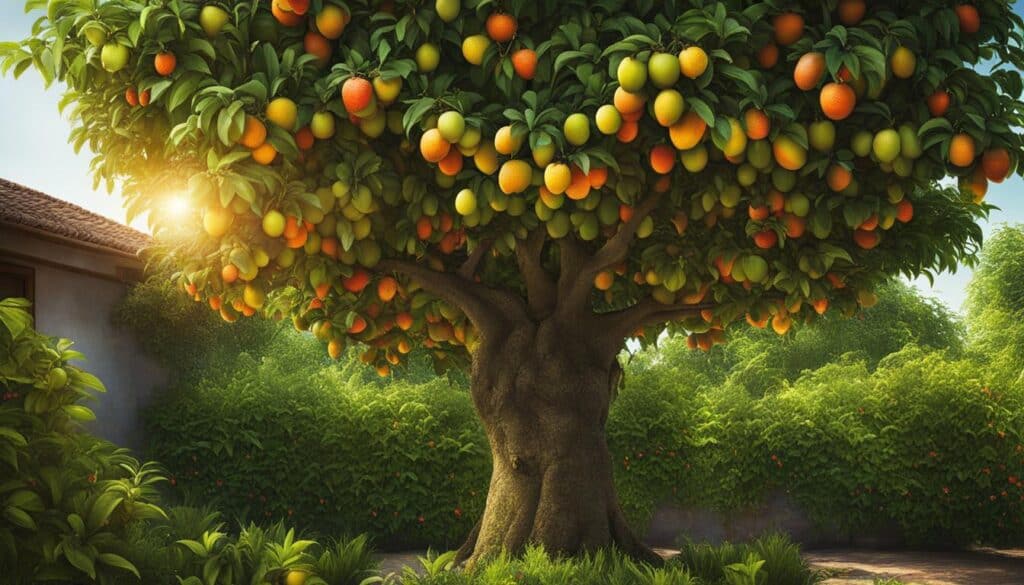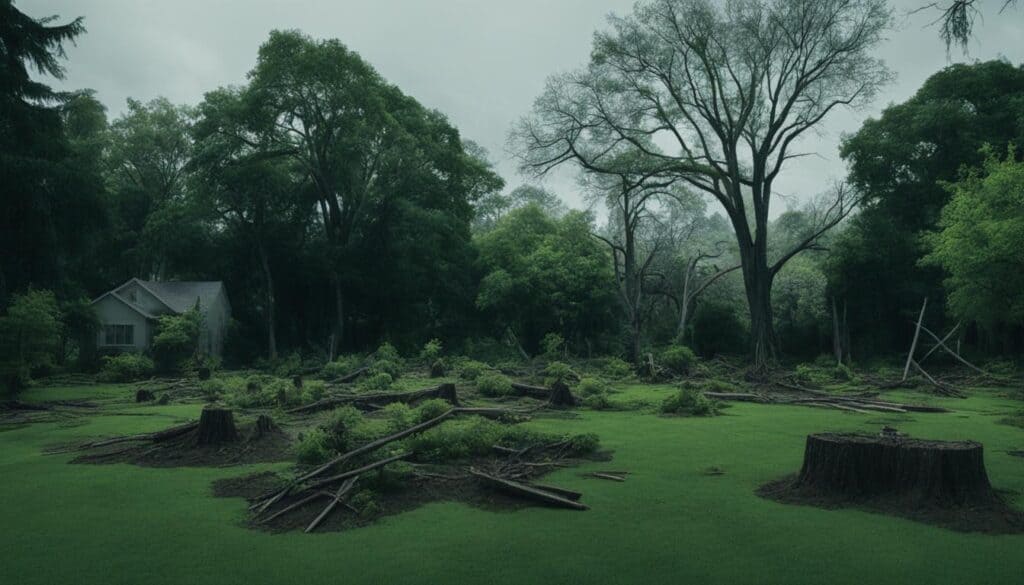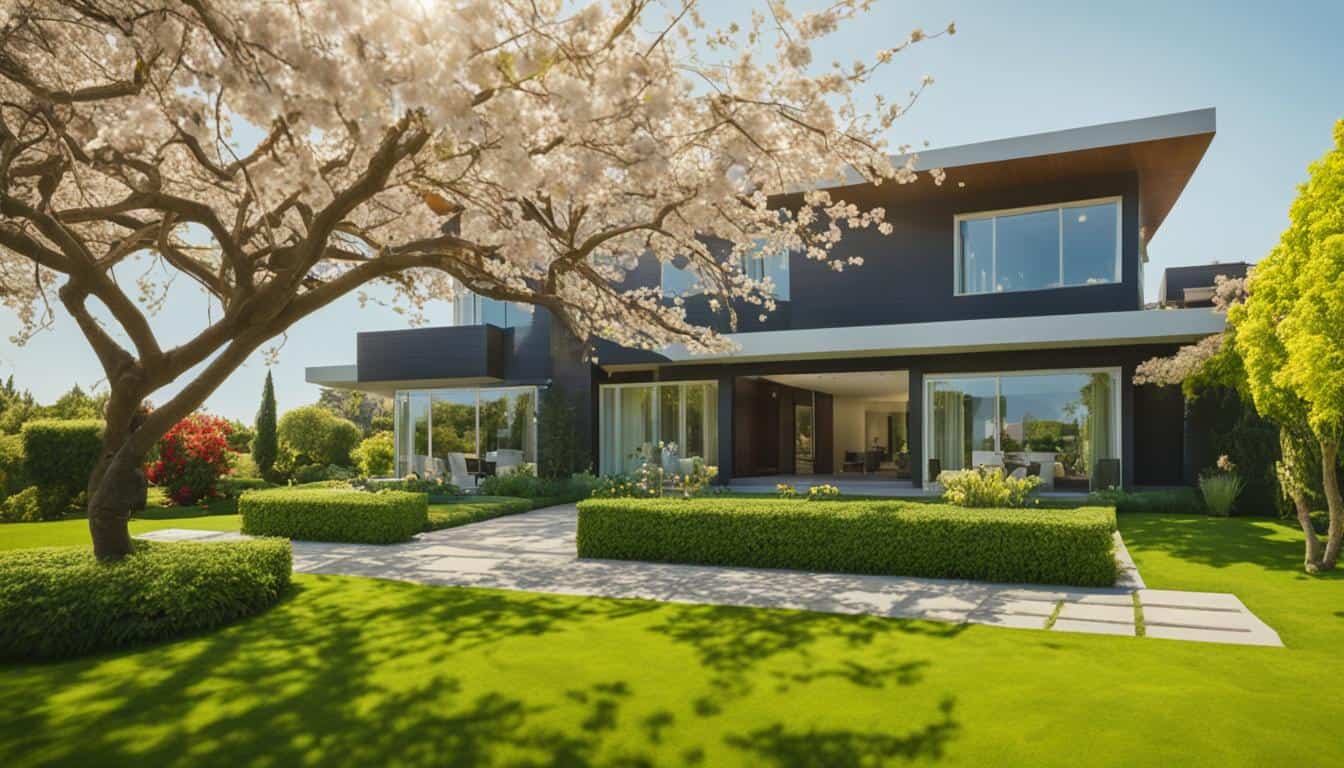Growing fruit trees on your property not only provides you with delicious, homegrown produce but can also have a positive impact on the value of your home. Numerous studies have shown that homes with trees, including fruit trees, can have a higher value than those without. In fact, the value of a tree can range from 3.5% to 15% of a property’s total value, depending on various factors.
Having fruit trees on your property offers both aesthetic and practical benefits. They not only enhance the beauty of your landscape but also provide shade, improve air quality, and help reduce energy costs. With these advantages, it’s no wonder that fruit trees have become a popular addition to many residential properties.
Key Takeaways:
- Having fruit trees on your property can increase its value by 3.5% to 15%.
- Fruit trees provide both aesthetic and practical benefits to homeowners.
- They enhance the beauty of the landscape, provide shade, improve air quality, and reduce energy costs.
- Investing in fruit trees is a great way to add value to your property.
- Consider growing a variety of fruit trees to enjoy a diverse range of homegrown produce.
The Financial Impact of Fruit Trees on Property Value
Homes with fruit trees can have a significant impact on their overall value. Studies have shown that properties with trees can fetch anywhere from 3.5% to 15% more than those without. For homeowners, this means a potential increase in profit ranging from $14,000 to $61,000 for a median-priced home in the United States. The exact premium that a fruit tree can provide depends on various factors, including its location, appearance, condition, and maturity.
So, how do fruit trees add value to your property? Well, it starts with their aesthetic appeal. Beautifully landscaped properties with fruit trees exude charm and create a welcoming atmosphere. Potential buyers are often drawn to homes with well-maintained gardens, and the presence of fruit trees can make a lasting impression.
Furthermore, fruit trees offer practical benefits that can appeal to buyers. These trees provide shade, reducing the need for excessive air conditioning during hot summer months. This can lead to energy cost reduction, which homeowners appreciate. Additionally, fruit trees contribute to a sustainable lifestyle as they offer fresh produce right in your backyard, promoting self-sufficiency and healthy living.
“By planting fruit trees, homeowners can not only enjoy a beautiful outdoor space, but also add value to their property.”
When it comes to maximizing the value of fruit trees, proper care and maintenance are crucial. Regular pruning, watering, and fertilizing ensure that the trees remain healthy and visually appealing. Buyers are more likely to be attracted to properties with well-kept fruit trees, as opposed to those with neglected or diseased trees that might require extensive work or removal.
The Financial Impact of Fruit Trees: A Snapshot
Here is a summary showing how fruit trees can increase the value of your property:
| Fruit Trees | Potential Increase in Property Value |
|---|---|
| Increase in profit for a median-priced home in the US | $14,000 to $61,000 |
| Percentage increase compared to homes without trees | 3.5% to 15% |
| Benefits to buyers | Enhanced aesthetic appeal, shade, energy cost reduction, and fresh produce |
As you can see, planting fruit trees not only enhances the beauty of your property but also has a positive financial impact. By investing in fruit trees and giving them the proper care, you can increase your home’s value while enjoying the many benefits they bring.
The Benefits of Trees on Property Value
Trees have numerous benefits that contribute to the value of a property. Not only do they enhance the aesthetic appeal of a property, but they also have positive effects on the environment and create desirable outdoor spaces for potential buyers to enjoy.
One of the key advantages of trees is their ability to improve air quality. Through the process of photosynthesis, trees absorb carbon dioxide and release oxygen, helping to reduce overall pollution levels. This can create a healthier and more pleasant living environment for residents.
Additionally, trees play a crucial role in reducing water runoff. Their expansive root systems help to soak up rainwater, which helps prevent soil erosion and the accumulation of water in unwanted areas. This can be particularly beneficial for properties located in areas prone to flooding.
Trees also offer the opportunity for potential buyers to envision themselves using the outdoor spaces of a property. The shade provided by trees can create comfortable areas for picnics, relaxation, or even a children’s play area with swings or hammocks. These features add a sense of livability and enjoyment to the property.
Last but not least, homes with trees tend to sell faster than those without. According to some studies, properties with well-maintained trees can sell up to three times faster. The presence of trees creates a positive first impression and contributes to the overall appeal of the property.
“The presence of well-maintained trees can significantly impact a potential buyer’s perception of a property. It adds a sense of tranquility and natural beauty, making it more desirable.”
To showcase the benefits of trees on property value, take a look at the table below:
| Benefits of Trees on Property Value | Explanation |
|---|---|
| Enhanced Aesthetic Appeal | Trees add beauty and visual appeal to a property, making it more attractive to potential buyers. |
| Improved Air Quality | Trees absorb carbon dioxide and release oxygen, contributing to a healthier living environment. |
| Reduced Water Runoff | The root systems of trees help to absorb rainwater, preventing soil erosion and flooding. |
| Creation of Outdoor Spaces | Trees provide shade and create opportunities for outdoor activities like picnics and leisure time. |
| Increased Property Appeal | Homes with trees tend to sell faster, as they offer a more visually appealing and desirable living environment. |
Factors That Influence a Tree’s Value
When considering the value of a tree, several factors come into play, including its size, species, health, and placement on your property. These elements contribute to the overall appeal of the tree and its impact on property value.
Appraising the value of a tree is typically done for insurance or legal purposes, utilizing formulas that take into account these factors. By understanding the various aspects that influence a tree’s value, you can make informed decisions about maximizing the value of your property.
Certain tree species are highly valued for their beneficial characteristics. For example, white firs, Colorado blue spruces, American beeches, and sugar maples are among the most valuable trees. These species often possess desirable traits such as longevity, attractive foliage, or unique characteristics that make them stand out.
However, it’s essential to note that the value of a tree is not directly translated into the price of a house. Instead, having mature and well-maintained trees enhances the overall aesthetic appeal of your property, making it more attractive to potential buyers. The presence of these trees can create a serene and inviting atmosphere, contributing to a higher perceived value.
Factors That Influence Tree Value:
| Factor | Description |
|---|---|
| Size | The size of a tree can impact its value, as larger trees tend to have a greater visual impact and provide more benefits such as shade and windbreak. |
| Species | Some tree species are highly valued for their aesthetic appeal, unique characteristics, or desirable traits like fruit-bearing. |
| Health | A healthy tree is more visually appealing and less likely to pose any risks or require extensive maintenance. |
| Placement | The location of a tree on your property can influence its value. Trees that enhance the curb appeal or provide shade to specific areas can contribute to the overall value. |
By considering these factors and investing in the maintenance and care of your trees, you can maximize their value and the appeal they bring to your property. The value of your trees, in combination with other landscaping features, can significantly impact the overall property value.
The Importance of Well-Maintained Trees
The real value of well-maintained trees comes from how appealing they make the property to potential buyers. Buyers are drawn to beautiful, grand, and healthy trees that frame the architecture and create a pleasant backdrop for outdoor activities. Well-maintained trees can significantly enhance the aesthetic charm of a property, making it more visually appealing and increasing its desirability.
Poorly cared-for trees, on the other hand, can have a negative impact on the property’s value. Trees that are dying, unhealthy, or at risk of toppling over can be a deterrent to potential buyers. Trees with poor structure, significant deadwood, branches touching the house, or bearing noxious fruit can also decrease the property’s appeal, ultimately affecting its value.
“Well-maintained trees can significantly enhance the aesthetic charm of a property, making it more visually appealing and increasing its desirability.”
To maximize property value with tree care, it is crucial to prioritize regular maintenance tasks such as pruning, fertilizing, watering, and inspecting for any signs of disease or pests. By investing in the proper care and maintenance of trees, property owners can ensure that their trees remain healthy, vibrant, and appealing to potential buyers, thus safeguarding and potentially increasing their property value.
Taking care of trees also involves addressing potential risks, such as removing dead or hazardous branches, and ensuring that trees do not pose a threat to the property or its occupants. Regular tree care can help prevent accidents, protect the property from damage, and provide reassurance to buyers that the property is well-maintained and safe.
Benefits of Well-Maintained Trees:
- Aesthetic Appeal: Well-maintained trees create a visually pleasing and inviting landscape that can attract potential buyers.
- Enhanced Property Value: Properties with well-maintained trees are often perceived as more valuable and desirable, leading to increased property prices.
- Shade and Energy Efficiency: Properly placed trees can provide shade, reducing the need for air conditioning and saving on energy costs.
- Improved Air Quality: Healthy trees contribute to cleaner air by absorbing pollutants and releasing oxygen.
- Erosion Control: Trees with a well-developed root system help prevent soil erosion and stabilize the property.
When it comes to maximizing property value with tree care, investing time and resources in the maintenance of trees can yield substantial returns. By ensuring that trees on the property are well-maintained, property owners can create a visually appealing and safe environment that attracts potential buyers and increases the value of their property.

Trees That Enhance Property Value
When it comes to boosting property value, certain trees can make a significant impact. Whether you’re looking to increase the market appeal of your home or maximize its value, considering the right trees is essential. Here are the types of trees that are known to enhance property value:
- Mature Trees: Mature trees are highly valued due to their grandeur and established beauty. They provide an instant visual appeal and can significantly enhance the overall value of your property.
- Native Species: Native trees are well-adapted to the local climate and require less maintenance. They seamlessly blend with the surrounding environment, providing an authentic and charming aesthetic.
- Fruit Trees: Not only do fruit trees add beauty to your property, but they also offer the practical benefit of fresh produce. This combination of aesthetics and functionality can greatly attract potential buyers and boost your property’s value.
- Shade Trees: Shade trees, such as oaks or maples, can provide relief from the hot sun and reduce energy costs by lowering the need for air conditioning. Their energy-saving potential appeals to homebuyers, contributing to increased property value.
- Evergreen Trees: Evergreen trees offer year-round beauty and privacy. Their lush foliage and vibrant green color provide a consistent backdrop that can enhance the aesthetics and curb appeal of your property.
- Flowering Trees: Flowering trees, like cherry blossoms or dogwoods, bring seasonal bursts of color and visual interest. They create a charming and picturesque ambiance that can leave a lasting impression on potential buyers.
By strategically selecting and incorporating these types of trees into your property, you can maximize its market appeal and ultimately increase its value.

Having trees that enhance property value is a smart investment. Not only do they contribute to the overall appeal of your home, but they also provide numerous benefits, such as improved aesthetics, energy savings, and fresh produce. Consider the types of trees that align with your property and make an informed decision to enhance your property’s value and marketability.
How Placement and Care Impact Value
The placement of trees on your property can have a significant impact on their value. Strategically positioning trees in prominent front-yard locations can increase the premium they fetch. These large trees not only enhance the aesthetics of your home but also create an inviting atmosphere for potential buyers.
Additionally, trees that offer shade on back patios or act as privacy screens can be highly valuable. They provide a tranquil outdoor space for relaxation and entertainment, making your property more desirable.
However, it’s important to remember that the value of a tree is not solely determined by its placement but also by how well it is cared for. Proper tree care and maintenance are crucial for maximizing a tree’s value and ensuring its longevity.
Regular watering, pruning of dead and diseased limbs, and mulching are essential aspects of tree care. These practices help to promote healthy growth, prevent disease, and maintain an appealing appearance. Well-cared-for trees are more likely to thrive and continue to add value to your property over time.
Proper Tree Care Tips:
- Water trees deeply and regularly, especially during dry periods.
- Prune dead and diseased branches to maintain tree health and appearance.
- Apply mulch around the base of the tree to conserve moisture and control weeds.
By implementing these care practices, you can ensure that your trees remain beautiful and manageable. This not only enhances your property’s value but also reduces potential difficulties for both homeowners and potential buyers.
| Proper Tree Care Benefits | Improper Tree Care Consequences |
|---|---|
| Enhances aesthetics | Negatively impacts property value |
| Promotes healthy growth | Limited lifespan of the tree |
| Prevents disease and pests | Increased risk of tree damage or removal |

Considerations for Property Value and Trees
When it comes to the impact of trees on property value, there are a few important considerations to keep in mind. While trees can enhance the value of a property, certain factors can potentially affect their impact. In this section, I will discuss two crucial aspects: tree removal and tree-related regulations.
Tree Removal and Property Value
While trees can add value to your property, there are instances where removing a tree may be necessary. It is important to note that poorly cared-for trees or those that pose risks can have a negative impact on property value. Trees with significant deadwood or branches touching the house may not only be aesthetically unpleasing but also pose a potential hazard. In such cases, it may be advisable to consider tree removal.
That being said, it is essential to understand that tree removal can be a costly endeavor. Prices for tree removal can range from $200 to several thousand dollars, depending on various factors such as the size of the tree and the complexity of the removal process. Therefore, it is crucial to weigh the potential benefits against the associated costs before making a decision.

Tree-Related Regulations and Property Value
Tree-related regulations can also have an impact on property value, as they may limit homeowners’ options when it comes to tree removal. Some cities have specific regulations in place regarding tree removal, requiring homeowners to obtain special permits or approvals before removing trees.
In Aspen, Colorado, for example, homeowners need a special permit and approval from the city’s forester to remove trees. Such regulations are intended to protect the local environment and preserve the beauty and integrity of the city’s landscape.
These regulations, although well-intentioned, can affect property owners’ ability to make decisions about tree removal. It is important for homeowners to be aware of any tree-related regulations in their area and understand the potential impact on their property value.
| Consideration | Impact on Property Value |
|---|---|
| Poorly cared-for trees or those that pose risks | Negative impact |
| Tree removal cost | Can be costly |
| Tree-related regulations | May limit options for homeowners |
Considering these factors and understanding their potential impact on property value is crucial for homeowners. By weighing the pros and cons of tree removal and being aware of any tree-related regulations, homeowners can make informed decisions to maximize their property’s value.
The Financial Impact of Landscaping
Landscaping plays a significant role in maximizing property value. A well-designed and maintained landscape can greatly enhance the overall appeal of a property. From a beautifully manicured lawn to strategically placed shrubs and trees, landscaping features can add value and increase the marketability of a home.
When it comes to landscaping, several key factors can influence the financial impact on property value. Here are some landscaping features that can positively contribute to a property’s worth:
- A well-maintained lawn: A lush and healthy lawn is not only visually appealing but also reflects the care and attention given to the property.
- Strategically placed shrubs and trees: Trees and shrubs provide shade, privacy, and a sense of tranquility to outdoor spaces. They can also improve the energy efficiency of a home.
- A tidy garden: A well-kept garden with colorful flowers and neatly trimmed edges can enhance the aesthetic appeal of a property.
- A professionally landscaped pathway: A beautifully designed pathway leading to the entrance of a home can create a welcoming atmosphere and improve curb appeal.
- Outdoor lighting: Well-placed lighting fixtures not only provide illumination but also highlight the architectural features of a property, making it more visually striking.
- Fresh mulch: Mulching not only helps in weed control and moisture retention but also gives the landscape a polished and well-maintained appearance.
Investing in professional lawn care services can yield a significant return on investment. Studies have shown that the average ROI of lawn care services is 267%, making it a worthwhile investment for homeowners looking to maximize their property’s value.
Furthermore, professional landscaping design and installation can also contribute to a property’s overall value. A well-executed landscaping plan that incorporates functionality, aesthetics, and sustainability can greatly enhance a property’s market appeal.
While certain landscaping features can positively impact property value, it’s important to note that not all additions may have the same effect. Outdoor water features, artificial grass, an untended garden, broken fence panels, and swimming pools or hot tubs may not necessarily add value and could be seen as maintenance concerns to potential buyers.

Conclusion
Investing in fruit trees and prioritizing tree care can significantly enhance the value of your property. Studies consistently demonstrate that homes with well-maintained trees have higher market values, making them more appealing to potential buyers. Important factors that influence a tree’s value include its species, size, health, and placement on the property.
To maximize property value, consider incorporating native trees, fruit trees, shade trees, and flowering trees into your landscape. These tree varieties not only enhance the aesthetic appeal of your property but also provide practical benefits such as fresh produce, energy cost reduction, and year-round visual appeal.
Proper care and maintenance are crucial for ensuring that trees thrive and maintain their value over time. Regular watering, pruning of dead and diseased limbs, and mulching are essential aspects of tree care. It is also important to be mindful of potential risks and any regulations related to tree removal, as this can have an impact on property value.
Additionally, landscaping features like a well-maintained lawn, strategically placed shrubs and trees, tidy gardens, landscaped pathways, and outdoor lighting can further contribute to the overall value of your property. By investing in fruit trees, tree care, and landscaping, you can maximize your property’s value and create a beautiful and appealing environment for you and potential buyers.
FAQ
Do fruit trees increase property value?
Yes, having fruit trees on your property can increase its value. Trees in general have been shown to add anywhere from 3.5% to 15% more value to a home, and fruit trees specifically provide both aesthetic appeal and practical benefits such as fresh produce.
What are the benefits of fruit trees on property value?
Fruit trees can enhance the market appeal of a property by adding beauty and uniqueness. They also offer practical benefits such as shade, improved air quality, and potential savings on energy costs. Additionally, the presence of fruit trees can help potential buyers envision enjoying outdoor activities and gatherings under the shade of these trees.
How can I maximize property value with fruit trees?
To maximize property value with fruit trees, consider planting a variety of fruit trees that are suited for your climate and region. Additionally, proper care and maintenance are crucial. Regular watering, pruning, and fertilizing can help ensure the health and longevity of your fruit trees, which will in turn increase their value.
What is the impact of fruit trees on home value?
Fruit trees can significantly increase the value of your home. Studies have shown that homes with trees, including fruit trees, can have anywhere from 3.5% to 15% more value than those without. This increase in home value can mean an additional profit of anywhere from ,000 to ,000 for a median-priced home in the US.
How do fruit trees affect property value?
Fruit trees can have a positive impact on property value by enhancing the overall aesthetics of the landscape. They offer visual appeal, provide shade, and contribute to a healthier environment. The presence of fruit trees can also make your property more desirable, which can lead to a faster sale if you decide to put your home on the market.





Leave a Reply